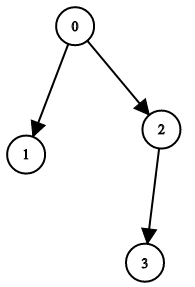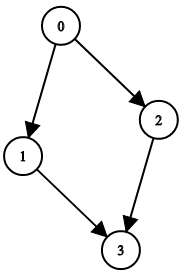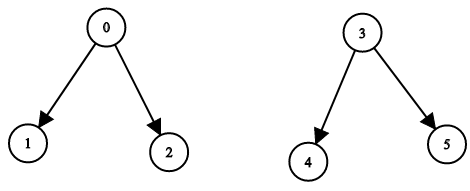Validate Binary Tree Nodes
Description
You have n binary tree nodes numbered from 0 to n - 1 where node i has two children leftChild[i] and rightChild[i], return true if and only if all the given nodes form exactly one valid binary tree.
If node i has no left child then leftChild[i] will equal -1, similarly for the right child.
Note that the nodes have no values and that we only use the node numbers in this problem.
Example 1:

Input: n = 4, leftChild = [1,-1,3,-1], rightChild = [2,-1,-1,-1] Output: true
Example 2:

Input: n = 4, leftChild = [1,-1,3,-1], rightChild = [2,3,-1,-1] Output: false
Example 3:

Input: n = 2, leftChild = [1,0], rightChild = [-1,-1] Output: false
Example 4:

Input: n = 6, leftChild = [1,-1,-1,4,-1,-1], rightChild = [2,-1,-1,5,-1,-1] Output: false
Constraints:
1 <= n <= 10^4leftChild.length == rightChild.length == n-1 <= leftChild[i], rightChild[i] <= n - 1
Solution(javascript)
/* eslint-disable no-loop-func */
/**
* @param {number} n
* @param {number[]} leftChild
* @param {number[]} rightChild
* @return {boolean}
*/
const validateBinaryTreeNodes = function (n, leftChild, rightChild) {
const used = new Array(n).fill(false)
let valid = true
const bfs = (index) => {
let current = [index]
used[index] = true
while (current.length > 0) {
const next = []
current.forEach((currentIndex) => {
if (used[leftChild[currentIndex]] || used[rightChild[currentIndex]]) {
valid = false
return
}
if (leftChild[currentIndex] !== -1) {
used[leftChild[currentIndex]] = true
next.push(leftChild[currentIndex])
}
if (rightChild[currentIndex] !== -1) {
used[rightChild[currentIndex]] = true
next.push(rightChild[currentIndex])
}
})
current = next
}
}
bfs(0)
return valid && used.every(x => x)
}
